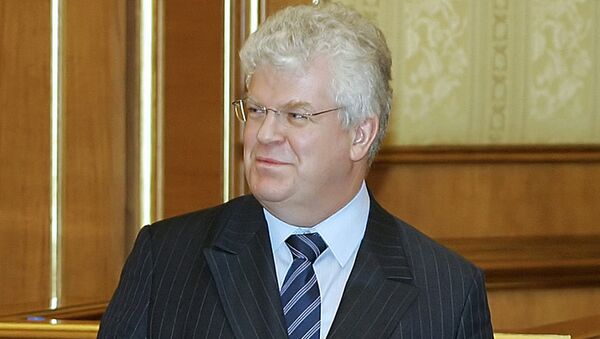BRUSSELS, August 1 (RIA Novosti) – Russia’s one-year ban on Western food imports have been introduced in accord with the World Trade Union (WTO) disciplines and designed to protect domestic producers, Vladimir Chizhov, the Russian permanent representative to the EU, said Thursday.
"These measures are actually a response to anti-Russian sanctions, introduced by the European Union and the governments of the affected [by Russia’s ban] countries, in particular, the United States, Canada, Australia, Norway. They [sanctions] are not intended to punish European suppliers, but to protect the interests of Russian producers of the similar goods and, of course, consumers," the senior diplomat said.
The response measures have been taken in full compliance with the WTO rules in order to balance out the current situation, Chizhov added.
"I can refer to Article XXI of the GATT (General Agreement on Tariffs and Trade) 1994, which provides for the adoption of such measures in the event of threats to national security as well as emergencies, and in this case we can talk about the threat to national food security," the diplomat said.
"While the EU were imposing so-called first and second stage sanctions, the Russian side did not react to them in such way, at least in relation to the European Union. When Sberbank and Rosselkhozbank, which are engaged in crediting Russian agriculture, were hit by third stage … sanctions, they ended up in a difficult situation, and this created a potential competitive advantage for exporters of similar agricultural products from the EU," the diplomat explained.
“These measures have been introduced for one year, but can be canceled and they will be canceled as soon as the European Union cancels its so-called third-stage sanctions," Chizhov added.
On Wednesday, Russian President Vladimir Putin signed an order on economic measures to protect the country's security. The decree banned for a year imports of agricultural and food products from countries that have imposed sanctions on Russia.
The complete “blacklist” of food imports from Australia, Canada, the European Union, the United States and Norway was announced Thursday. The list includes meat, poultry, fish, seafood, milk, dairy products, as well as fruits and vegetables. The embargo does not include infant foods and products.
The United States and European Union have been imposing targeted sanctions against a number of Russian officials and companies, accusing Moscow of meddling with Ukraine’s internal affairs. Last week, the EU introduced the third-stage sanctions targeting the financial, energy and defense sectors of the Russian economy. The sectorial sanctions hit five Russian banks, including the country’s biggest, Sberbank. The banks were banned from raising capital on the EU’s capital markets.
Moscow has repeatedly called the measures counterproductive and stressed that Russia was never involved in the Ukrainian conflict.



